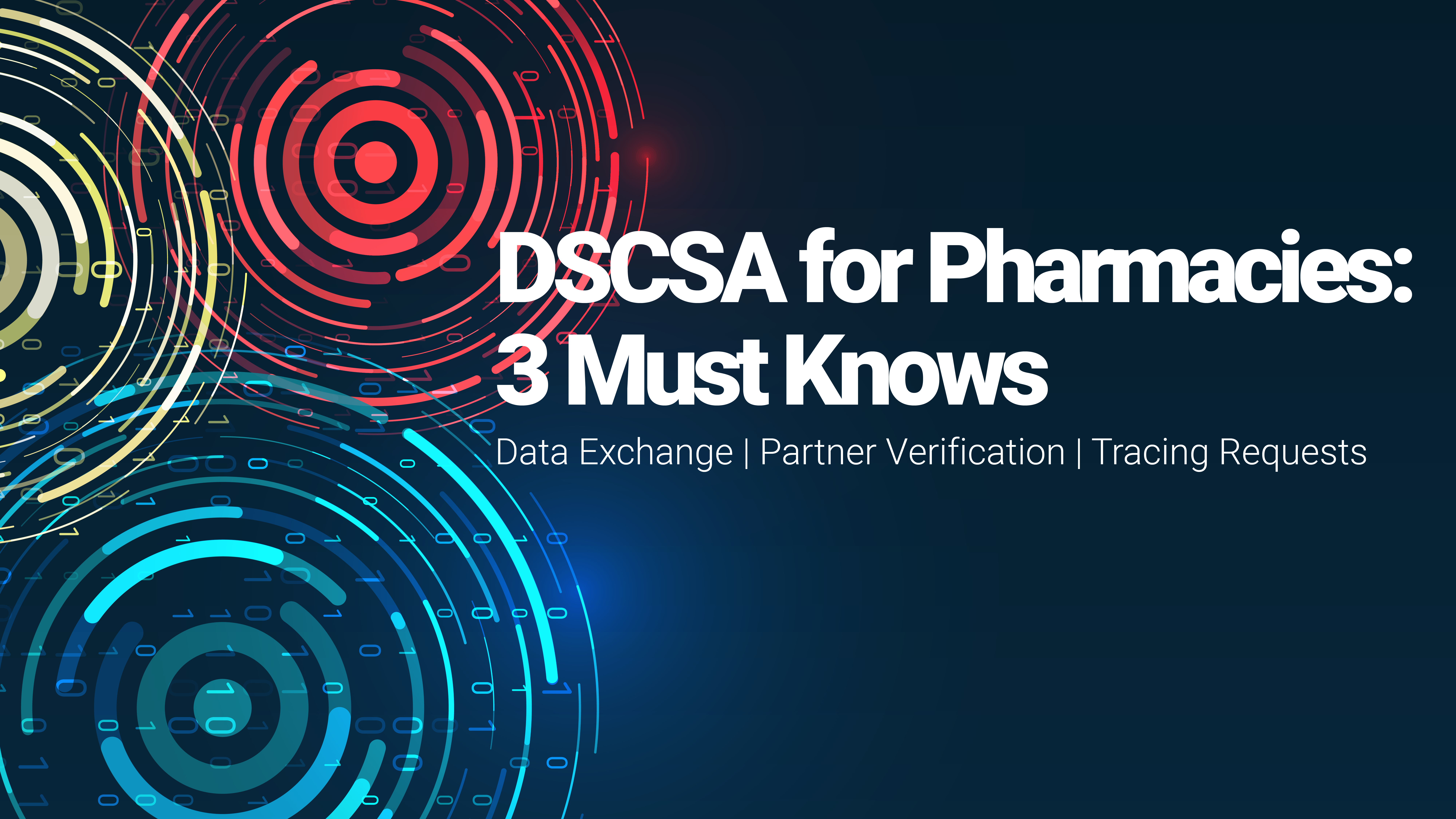DSCSA for Pharmacies:
3 Must Knows
Data Exchange | Partner Verification | Tracing Requests
January 17th, 2023
This is the year the pharmaceutical supply chain must comply with the FDA's Drug Supply Chain Security Act (DSCSA). These requirements must be met in order to operate within the US Drug Supply Chain. As the primary touchpoint between the supply chain and patients, pharmacies play an important role in the drug supply chain. This leaves pharmacies with little time to focus on DSCSA when compared to the rest of the drug supply chain.
Here are 3 DSCSA must knows for pharmacies:

#1 Exchanging Electronic Product Information
After November of this year pharmacies and other dispensers will need the ability to electronically receive serialized transaction data.
What does this mean?
The drug supply chain is required to begin exchanging serialized product data when there is a change in ownership. Dispensers must have access to the electronic serialized product data when physically taking ownership of a product.
How to do this?
Upstream trading partners (manufacturers, distributors, etc. ) are required to create, make available, and send the serialized product data. This means that pharmacies need a method or system to store, access, and exchange that data.
For more detail on upstream partner responsibilities check out: The Drug Manufacturer's DSCSA Dilemma
The good news for pharmacies and dispensers is that this is not something that carries a cost. It shouldn't anyway. Upstream trading partners have developed or purchased systems (like Trust.med) to store and make available the electronic serialized data for the shipments they receive.
Access to the data is simple - Here's how we do it for pharmacies.
Trust.med creates an account and special data storage for each pharmacy. This data storage can receive (and exchange) the serialized data from any of the pharmacy's trading partners. Data is stored in an industry preferred format called EPCIS or Electronic Product Code Information Services.
Pharmacies claim their Trust.med account. This allows them to login into their dashboard where they can receive, search, view, export, and send serialized product data. The dashboard can be accessed from any device that has internet access. Pharmacies can also request data from Trust.med be integrated into commonly used systems.
Each pharmacy is given a unique address for their product data storage location.
This unique address can be shared with any trading partner so that they may electronically exchange serialized product data with the pharmacy.
The challenge.
Exchanging serialized data can be nuanced when you dig below the surface of the requirement. Many trading partners with complex systems and large amounts of data are now required to harmoniously communicate. This has never been done with serialized product data.
Trading partners can use various systems to meet these requirements.
Pharmacies are required to obtain and access data for each product received. This information may exist in several locations. This requires the management of multiple systems, login credentials, and processes to retrieve data. Pharmacies and dispensers desiring a single storage location and point of access for all of their serialized product data (EPCIS) can use Trust.med at no cost. Pharmacies can then share their unique data address with upstream partners.
This allows manufacturers and distributors to begin exchanging data.
#2 Trading Partner Verification
After November, pharmacies and all drug supply chain trading partners can only physically move regulated drug products to and from authorized trading partners.
What does this mean?
If dispensers are not an authorized trading partner after November of this year (11/27/2023) they cannot send or receive regulated drug products within the United States.
The definition for what an authorized trading partner is depends on what type of entity they are in the drug supply chain. Pharmacies (retail, hospital, and chain) are considered to be an authorized trading partner when they have a valid license under state law and accept or transfer direct ownership of a drug product from an upstream trading partner or pharmacy.
There are caveats. Pharmacies who operate as wholesale distributors have a different definition of authorized trading partner - pharmacies should read the FDAs most recent guidance on identifying as an authorized trading partner to determine what does or does not make them an authorized trading partner. The FDA guidance on this topic is still in a draft state as of writing this blog.
How to do this?
Being able to prove authorized trading partner status directly correlates to a dispenser's state licensure status. Keeping licensure up to date and knowing how to access license information is key in maintaining authorized trading partner status as a pharmacy.
If you need the ability to check licenses, consider using a service that checks licenses or a service that provides / checks verifiable credentials.
Using and checking verifiable credentials can make it easier to check various license types and entities in an automated way.
The FDA draft guidance has a matrix detailing how to identify an authorized trading partner by entity type.
The challenge.
To be verified as an authorized trading partner (ATP) ,pharmacies must simply have a state license in good standing. The challenge comes down to the processes of checking the status of the license.
Upstream trading partners must verify that their trading partners are verified as an authorized trading partner.
How does an upstream trading partner accomplish this in a scalable, error free method?
Depending on their chosen verification checking method, verifiable credentials could be provided to pharmacies or it could be required that pharmacies acquire a verifiable credential on their own. Cost, time, and effort become challenges for all involved regardless of the method chosen.
Trust.med is a member of the Open-Credentialing Initiative and supports the use of verifiable credentials and license checking verification methods for authorized trading partner verification.

#3 Tracing Requests
Pharmacies are required to have the ability to perform tracing requests after November 27, 2023.
What does this mean?
DSCSA brings the requirement for dispensers to have the ability to submit tracing requests to their upstream trading partners. If required, a pharmacy must have the ability to submit a tracing request when asked to do so by an authorized entity / individual (FDA, DEA, Regulator, etc.).
In conjunction with the pharmacy requirements; upstream trading partners are required to have the ability to take in tracing requests and respond back to requestors within certain time constraints.
How to do this?
Emailing, pharmacy dashboards (like Trust.med), and proprietary solutions created by upstream trading partners may all be methods for submitting a tracing request.
The challenge.
Similar to the authorized trading partner status requirement, how tracing requests are submitted can vary. Since there is not a universal method for submitting tracing requests, pharmacies may find themselves with the burden to manage multiple interfaces and tracing request submission methods.
Trust.med provides a tracing request interface for pharmacies and dispensers to use at no charge.
Our tracing request interface contains a form located within your pharmacy dashboard, containing all required fields for the submission of a tracing request. Once the form is submitted your tracing request is delivered to your upstream partners so that they may respond.
Having an easy to use system for submitting tracing requests allows pharmacies to quickly access, complete, and submit tracing requests. Without a system like Trust.med pharmacies can manually manage the processes and methods for submitting tracing requests as set by their upstream trading partners.
Closing
Pharmacies, like all trading partners, are being required to take on new responsibilities because of DSCSA. These three key requirements for DSCSA are critical but not all encompassing. Collaboration and interoperability between all trading partners and their technology partners is of the utmost importance and should be considered as you review and implement solutions for compliance by November 27, 2023.

